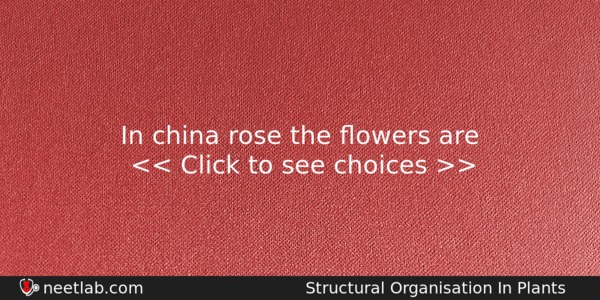| ⇦ | 
| ⇨ |
In china rose the flowers are
Options
(a) Actinomorphic, epigynous with valvate aestivation
(b) Zygomorphic, hypogynous with imbricate aestivation
(c) Zygomorphic, epigynous with twisted aestivation
(d) Actinomorphic, hypogynous with twisted aestivation
Correct Answer:
Actinomorphic, hypogynous with twisted aestivation
Explanation:
In china rose (Hibiscus rose-sinensis) flowers are actinomorphic , hypogynous and twisted aestivation in corolla.
Related Questions: - The signals for parturtition originate from
- Bone is connected to muscle with the help of
- A condition where a certain gene is present in only a single copy in a diploid
- The process of photorespiration occurs in
- Which statements about Spongilla, Leech, Dolphin and Penguin is correct?
Topics: Structural Organisation In Plants
(243)
Subject: Biology
(4253)
Important MCQs Based on Medical Entrance Examinations To Improve Your NEET Score
- The signals for parturtition originate from
- Bone is connected to muscle with the help of
- A condition where a certain gene is present in only a single copy in a diploid
- The process of photorespiration occurs in
- Which statements about Spongilla, Leech, Dolphin and Penguin is correct?
Topics: Structural Organisation In Plants (243)
Subject: Biology (4253)
Important MCQs Based on Medical Entrance Examinations To Improve Your NEET Score
18000+ students are using NEETLab to improve their score. What about you?
Solve Previous Year MCQs, Mock Tests, Topicwise Practice Tests, Identify Weak Topics, Formula Flash cards and much more is available in NEETLab Android App to improve your NEET score.
Share this page with your friends

Leave a Reply